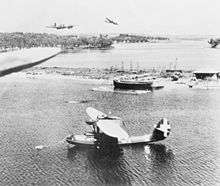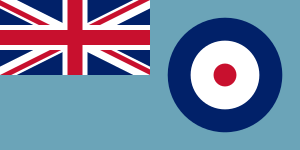No. 252 Squadron RAF
No. 252 Squadron RAF was a Royal Air Force (RAF) squadron that formed as a bomber unit in World War I and re-formed as part of RAF Coastal Command in World War II.
| No. 252 Squadron RAF | |
|---|---|
| Active | 1 May 1918 – 30 June 1919 21 November 1940 – 15 June 1941 14 November 1941 – 1 December 1946 |
| Country | |
| Branch | |
| Motto(s) | With or on |
| Insignia | |
| Squadron Badge | A Spartan Shield |
| Squadron Codes | PN (Nov 1940 - May 1941) BT (May 1941 –Nov 1942) |
History
Formation and World War I
No. 252 Squadron was formed at Tynemouth on 1 May 1918 as a day bomber unit when four RNAS flights were amalgamated and was equipped with the Blackburn Kangaroo and DH.6s. One of these flights, No. 510 (Special Duty) Flight was posted to Redcar with its DH.6s for protection of shipping in the Teesport area until 21 January 1919.
The squadron disbanded at RNAS Killingholme on 30 June 1919.
Reformation in World War II

On 21 November 1940 the squadron reformed at RAF Bircham Newton and was equipped with Blenheims and Beaufighters as a Coastal Command unit. It moved to Northern Ireland in April 1941 and an attachment went to Gibraltar.
The squadron was disbanded upon renumbering as No. 143 Squadron RAF on 15 June 1941 and re-established at Idku, Egypt on 14 Nov 1941. It then operated from Libya and various locations in Greece and was finally disbanded on 1 December 1946.
Aircraft operated
| From | To | Aircraft | Variant |
|---|---|---|---|
| May 1918 | Jan 1919 | Airco DH.6 | |
| May 1918 | Aug 1918 | Blackburn Kangaroo | |
| Dec 1940 | Apr 1941 | Bristol Blenheim | IF |
| Dec 1940 | Apr 1941 | Bristol Beaufighter | IVF |
| Dec 1940 | Jun 1941 | Bristol Beaufighter | IC |
| Nov 1941 | Jan 1944 | Bristol Beaufighter | IC |
| Sep 1942 | Jan 1944 | Bristol Beaufighter | VIC |
| Jun 1943 | Jan 1944 | Bristol Beaufighter | XI |
| Jun 1944 | Dec 1946 | Bristol Beaufighter | X |
References
- C.G.Jefford (1988). RAF Squadrons. UK Airlife Publishing. ISBN 1-85310-053-6.
External links
| Wikimedia Commons has media related to No. 252 Squadron RAF. |
